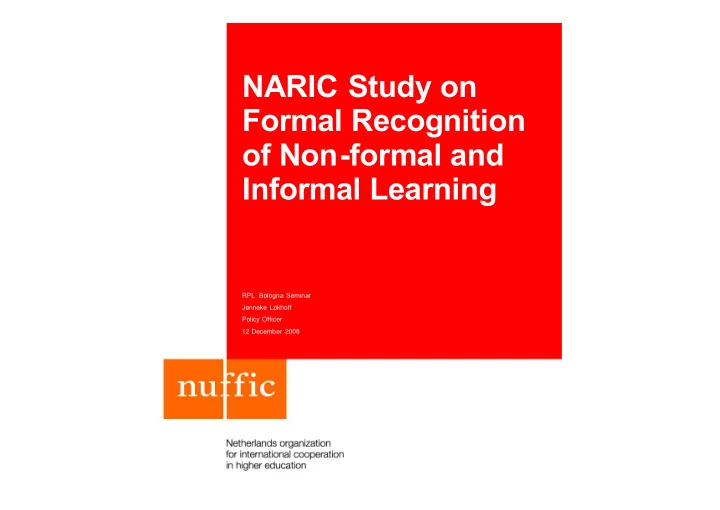

NARIC Study on Formal Recognition of Non-formal and Informal Learning RPL Bologna Seminar Jenneke Lokhoff Policy Officer 12 December 2008
Background (1) � National and international Lifelong Learning strategies � Increasing number of recognition practices of learning gained outside � formal � learning
Background (2) Bologna Ministerial Conference Communiqués 4th Bergen 2005 �� to improve recognition of prior learning including, where possible, non- formal and informal learning for access to, and as elements in, higher education programmes � . 5th London 2007 � Fair recognition of higher education qualifications, periods of study and prior learning, including the recognition of non-formal and informal learning, are essential components of the EHEA, both internally and in a global context � .
The study (1) Main goal: � Explore the possibilities of international recognition of certificates of non/informal learning Consortium � Nuffic � UK NARIC � French NARIC � Swedish NARIC
The study (2) Objectives twofold: � Mapping of the state of play of formal recognition of non-formal and informal learning � To analyze a number of sample certificates/reports and formulate recommendations for credential evaluators and higher education institutes how to deal with these certificates
Study (3) Scope: 10 countries/regions: Netherlands, Flanders, Wallonia, France, Denmark, Norway, Sweden, Scotland, England, and Ireland.
Research Phase I � State of play of formal recognition of non-formal and informal learning in the 10 regions: � General context � Purpose � Structure/organization of recognition � Future initiatives
Research Phase II � To analyze a number of sample certificates/reports: � Format design, � Quality assurance, � Value/Credits, � Assessment tools, and � Good and bad practices.
Evaluation (1) Format design � Formats varied � Different types of documents Suggestion: � Present key information in a clear, brief and specific way � Clear description ánd structuring of competences/skills (where applicable)
Evaluation (2) Value of Assessment and Credits Different ways in which the assessment was given value Suggestion: � In case assessment results in awarding credits, clarification credits (ECTS).
Evaluation (3) Quality assurance � Half of cases no explicit mention of quality assurance was made on the document. Suggestion: � Reference to internal and/or external QA procedures of the assessment
Evaluation (4) Assessment and standard tools � Except for one certificate it was not indicated which assessment instrument were used Suggestion: � Information on assessment procedure, standards and methods used � Information who (and when) undertook the assessment
Recommendations for institutions and bodies (1) Main document � Level at which the RPL was assessed � The profile of the course/module/programme � Exemptions granted in terms of institutional/national/or ECTS credits
Recommendations for institutions and bodies (2) Annex: � Learning outcomes of the course (reference to the NQF,EQF) � Details on the RPL assessment procedure � Reference to RPL contact point at an institution who could supply further information � Glossary of terms for abbrevations
Recommendations for credential evaluators include: � Trust the higher education institution, � Identify the standards against which the non-formal and informal learning has been assessed, and � Format complies with the institutional norms.
General observation Variety of documents: reports, certificates and documents proving � RPL � � � On international ánd national level
Follow up project REFNILLO Aim: � to explore to which extent the recommendations of this study can be carried by the whole network Results: fall 2009
Thank you for your attention! Contact details Jenneke Lokhoff Policy Officer jlokhoff@nuffic.nl Website www.rpl.naric.org.uk
Recommend
More recommend